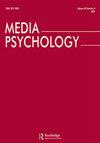Mutual Influence in LGBTQ Teens’ Use of Media to Socialize Their Parents
IF 2.6
2区 心理学
Q1 COMMUNICATION
引用次数: 6
Abstract
ABSTRACT Recent theorizing posits that parents and their children influence each other, and that media use is a locus of such mutual influence. Two surveys of LGBTQ 18- and 19-year-olds (N = 276; N = 369, the latter a replication) tested hypotheses that LGBTQ teens use media to socialize their parents about their sexual and gender identities, and that these uses elicit parental responses which have implications for the teen. In both studies, teens reported co-viewing and mediating their parents’ exposure to LGBTQ content (i.e., encouraging positive exposure, discouraging negative exposure, critiquing/explicating depictions) and indicated that such moments sometimes elicited conversations about their own sexual or gender identities. In both studies, their perceptions of their parents’ receptivity to these interactions varied widely. In both studies, teens’ LGBTQ-media-related behavior and perceptions of parental receptivity were positively associated with perceptions that their parents supported their LGBTQ identity. Perceived receptivity (in Study 1) and perceived support for the teens’ LGBTQ identities (in Study 2) were associated with teens’ self-esteem and depressive symptoms. Overall, despite some inconsistencies between the two studies and the limitations of cross-sectional data, the findings are consistent with mutual influence.LGBTQ青少年使用媒体社会化父母的相互影响
摘要最近的理论认为,父母和孩子相互影响,媒体的使用是这种相互影响的场所。两项针对18岁和19岁LGBTQ青少年的调查(N=276;N=369,后者是一种复制)检验了以下假设:LGBTQ少年利用媒体向父母宣传他们的性和性别身份,这些使用会引发父母的反应,对青少年有影响。在这两项研究中,青少年都报告了共同观看和调解父母对LGBTQ内容的接触(即鼓励正面接触、劝阻负面接触、批评/解释描述),并表示这些时刻有时会引发关于他们自己性或性别身份的对话。在这两项研究中,他们对父母接受这些互动的看法差异很大。在这两项研究中,青少年与LGBTQ媒体相关的行为和对父母接受度的看法与父母支持其LGBTQ身份的看法呈正相关。感知接受能力(在研究1中)和对青少年LGBTQ身份的感知支持(在研究2中)与青少年的自尊和抑郁症状有关。总的来说,尽管这两项研究之间存在一些不一致之处,而且横截面数据也有局限性,但研究结果是相互影响的。
本文章由计算机程序翻译,如有差异,请以英文原文为准。
求助全文
约1分钟内获得全文
求助全文
来源期刊

Media Psychology
Multiple-
CiteScore
8.60
自引率
7.10%
发文量
30
期刊介绍:
Media Psychology is an interdisciplinary journal devoted to publishing theoretically-oriented empirical research that is at the intersection of psychology and media communication. These topics include media uses, processes, and effects. Such research is already well represented in mainstream journals in psychology and communication, but its publication is dispersed across many sources. Therefore, scholars working on common issues and problems in various disciplines often cannot fully utilize the contributions of kindred spirits in cognate disciplines.
 求助内容:
求助内容: 应助结果提醒方式:
应助结果提醒方式:


